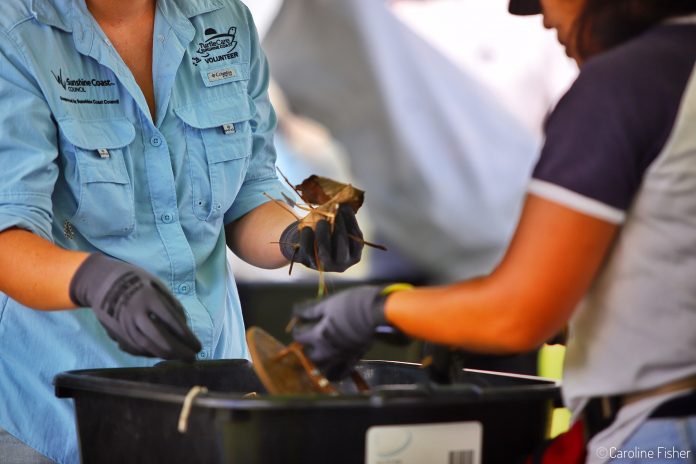A reduction in the amount of rubbish collected at this year’s clean up for the hatchlings event has organisers optimistic there is a change of behaviour towards littering.
A total of 495.5 kilograms of rubbish was picked up by 697 volunteers from 19 locations across the Sunshine Coast, 100 kilograms less than last year.
The reduced amount of litter collected has left organisers with the hope that a genuine behaviour change is setting in.
Environment Portfolio Councillor Peter Cox thanked the 697 volunteers who joined in the clean-up effort.
“I’m really pleased to hear that even though we had more volunteers than last year, less rubbish was collected,” Cr Cox said.
“For the past three years, the amount of litter collected at this annual event has continued to go down, showing that our community is becoming more proactive and responsible in how they dispose of their rubbish.
“Less rubbish on the beach and in our waterways is good for our environment, our wildlife and our turtle hatchlings.
“This season already, we’ve seen two clutches of turtle hatchlings emerge and make their way out to the ocean, and there are more to come over the next two to three months.
“When they are in their post-hatchling stage, at 10–40 centimetres, they float to the surface and eat everything around them, usually plankton and little jellyfish, but also, unfortunately, a lot of plastic.
“By cleaning up rubbish from our waterways and beaches, and reducing litter in general, we’re helping the survival rates of these hatchlings and other marine wildlife.”

An annual event
Clean Up for the Hatchlings is an annual event, now in its eighth year, hosted by Sunshine Coast Council, in partnership with Reef Check Australia, Unitywater, SEA LIFE Trust and Clean Water Group.
Following the clean-up activities, hundreds of volunteers enjoyed a free barbecue, activities, speakers and more at La Balsa Park in Buddina where they also weighed and sorted the debris collected, contributing to the Australian Marine Debris Initiative (AMDI) database.
Groups nation-wide input their information into the AMDI database, recording the location, quantities and types of marine rubbish collected, to give an overview of the impact on beaches across the country.
Council’s Environmental Operations Senior Project Officer and event organiser Raeleen Draper said the data collected of the day would informed source reduction projects.
“Some of the top items picked up were cigarette butts, single use plastic items such as straws, cutlery and plastic food packaging. This year we also saw an extraordinary amount of microplastics – and unfortunately there was even two couches collected from Warana,” Ms Draper said.
“By entering data into the Australian Marine Debris Initiative database, it helps government and the community come up with solutions to reduce rubbish at the source so it doesn’t end up at the beach and in our oceans in the first place.”
Special thanks go out to the many community groups who regularly host their own beach clean-up activities and who are regular supporters of council’s Beach Clean-Up program.
To find out more about future clean-up events or if you’re interested in hosting your own, visit Sunshine Coast Council’s website sunshinecoast.qld.gov.au and search for “Beach Clean Up Program”.





